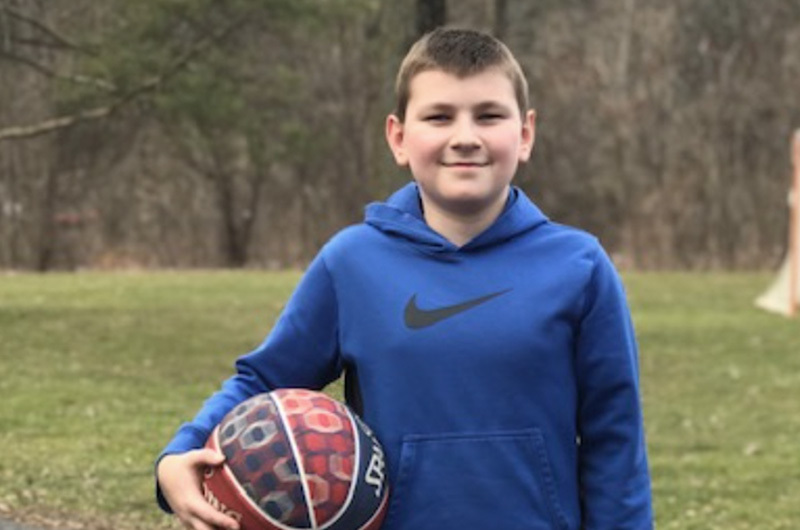IBD surgery gives Ben a new taste for life (and hamburgers)

Ben Irland, 13, has been enjoying a lot of hamburgers lately. It’s an exciting development for him, since until recently meat — as well as most other foods — caused him pain.
That’s because Ben has been dealing with the effects of Crohn’s disease, one form of inflammatory bowel disease (IBD), for the past decade.
Last year he traveled from his home in Geneva, New York, to the Department of Gastroenterology, Hepatology, and Nutrition at Boston Children’s Hospital. Under the care of Dr. Athos Bousvaros, the department’s associate chief, Ben underwent removal of a portion of his large intestine (partial colectomy) by surgeon Dr. Jill Zalieckas. The results have been life changing, according to his mom, Karen, who is a post-operative care nurse at her local hospital. She points out that in the months since the surgery, Ben has felt better than ever — and hamburgers have now become a staple on the family menu.
Dealing with IBD symptoms
Ben’s medical journey began at age 3, when he started bleeding from his large intestine and rectum (the end of the large intestine). After multiple trips to his local doctor, he was initially diagnosed with ulcerative colitis, a type of IBD. Common signs of ulcerative colitis include diarrhea, ulcers, pus, mucus, and bleeding.
Over the years since the diagnosis, Ben’s local doctors tried out many different medications to address the symptoms, but none of them were fully effective. He was also prescribed steroids, which stunted his growth. Yet he continued to have symptoms despite all of the treatments he tried.
Dealing with both the physical and emotional effects of the disease was very difficult for Ben, says Karen. He enjoyed playing sports but had to stop, since he was tired and always had to be near a bathroom. School also posed challenges, especially since not all of his teachers would allow him to go to the bathroom whenever he needed it. “By the time he was in the sixth grade, Ben was very skinny and looked very, very sick,” she says. He had also missed a lot of school and needed a tutor.
Karen finally asked her local children’s hospital about surgery. “But they didn’t want to do it. They kept pushing medicine instead,” she remembers. This prompted her to bring Ben to another doctor for a second opinion; that clinician suggested she bring Ben to Boston Children’s for answers.
Turning to Boston Children’s for answers
Upon further evaluation by the medical team, it was determined that Ben did not have ulcerative colitis after all, but rather Crohn’s disease, a different kind of IBD. In addition, the evaluation demonstrated that all of his symptoms were being caused by one small diseased area in his colon, which could potentially be removed without removing the whole colon.
“I told Dr. Bousvaros all of my concerns and he said Ben could try another type of medicine and see if it worked, or he could go right to the surgery,” Karen says. She decided to go with the surgical approach. But she had one concern: Dr. Bousvaros had said that if Dr. Zalieckas had to remove too much of the intestine to reconnect it, Ben could potentially require an ostomy (a drainage bag outside of his body) to process waste.
“I was worried he would need a bag since I knew he wouldn’t want to go to school with it. I also worried about how he would play sports, which he really loved,” she says.
Nonetheless, she put her faith in Dr. Zalieckas and hoped for the best. In October 2019, Ben underwent the surgery, which was performed laparoscopically. It was a success.
“When he came out of surgery, I found out he didn’t need a bag and I felt 20 pounds lighter,” she says. “He was out of bed and walking by that night. We couldn’t have asked for a better outcome. We have been sincerely blessed.”
Throughout the entire experience, Karen says that the staff at Boston Children’s made her feel comfortable and explained everything so she understood the entire process and knew what to expect. “Everyone’s bedside manner has been phenomenal,” she says.
Thriving after IBD surgery
Once Ben got back home, he continued to improve. Within a week he was even well enough to go back to school. Since his surgery, he has been managed by his local team of pediatric gastroenterologists in upstate New York and has done very well, with no sign of recurrence of his Crohn’s disease.
“Ben also grew 2 inches since last fall because he doesn’t need the steroids anymore,” she says. This is the first time his siblings, Rian, 12, and Jacob, 10, have seen their brother not in pain and now the three of them are enjoying spending more time together.
Ben is starting high school this month and in the midst of COVID-19, is careful to social distance and wear his mask. But none of that is stopping him from finally being able to enjoy his life.
Learn more about the Department of Gastroenterology, Hepatology, and Nutrition, the Department of Surgery, and the Inflammatory Bowel Disease Center.
Related Posts :
-

How a meniscal transplant made me a Boston sports fan
I was in kindergarten when my knee started popping and cracking. My parents and I didn’t know it at ...
-

Hard and beautiful at the same time: Five lessons of raising a medically complex child
When they learned they were expecting a baby, Michelle and Stephen Strickland were delighted. The South Carolina couple looked forward ...
-

‘Challenge accepted’: Sophia takes on a brain tumor
In 2023, Sophia Mordini landed the role of a lifetime. A competitive dancer, the 12-year-old would play Clara in her company’...
-

After surgeries to treat HLHS, Carter is healthy and happy at home in Florida
Carter Miller loves action. The 4-year-old Florida resident enjoys riding on golf carts and flying high on swing sets. ...





